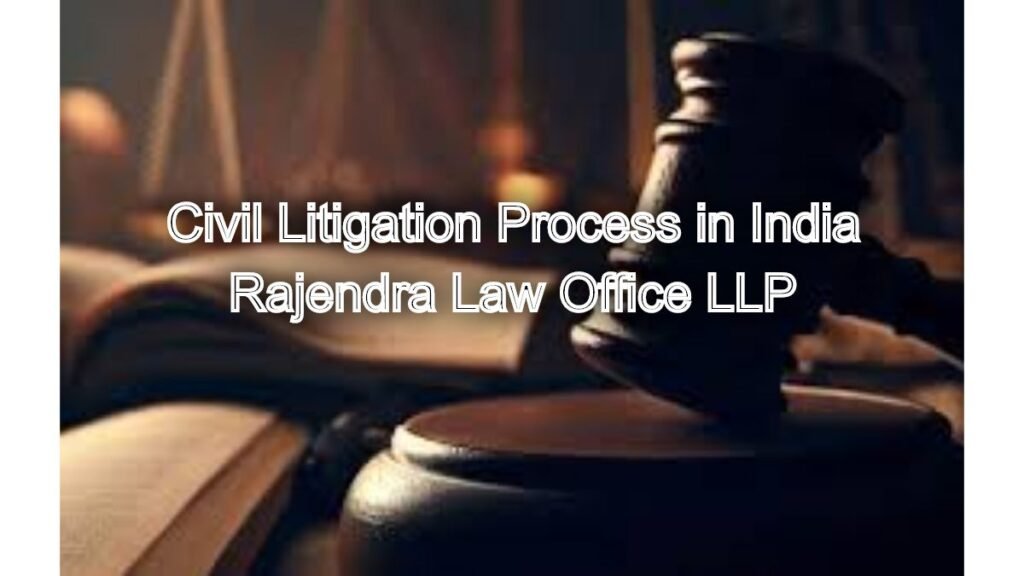Civil Litigation Process in India: Civil litigation is a legal process involving a dispute between two or more parties. In India, civil litigation is governed by the Code of Civil Procedure, 1908 (CPC). This comprehensive guide will delve into the key stages of the civil litigation process in India, providing a clear understanding of the legal procedures and steps involved.
Civil Litigation Process in India: A Comprehensive Guide
Initiation of a Civil Suit
The first step in a civil litigation process is the filing of a Plaint. This is a formal document that outlines the cause of action, the relief sought, and the facts supporting the claim. Once the plaint is filed, it is presented to the court, which then issues a Summons to the defendant.
Summons and Appearance
The summons serves as a formal notice to the defendant, informing them about the lawsuit and requiring them to appear before the court on a specified date. Upon receiving the summons, the defendant may choose to file a Written Statement, which is a response to the plaintiff’s claims.
Pleadings and Issues
The plaintiff’s plaint and the defendant’s written statement collectively form the Pleadings. These pleadings help to identify the Issues in the case, which are the disputed points of fact or law that need to be determined by the court.
Pre-Trial Procedures
Before the trial commences, several pre-trial procedures may take place. These include:
- Discovery and Inspection: This involves the exchange of documents and information between the parties.
- Interrogatories: Written questions are sent to the opposing party, who must provide written answers under oath.
- Admissions: The parties may agree on certain facts to simplify the trial process.
Trial
The trial is the core stage of the civil litigation process. It involves the presentation of evidence and arguments by both parties. The evidence may be in the form of documents, witness testimony, or expert opinions. The court will assess the evidence and arguments to determine the facts of the case.
Judgment and Decree
After considering the evidence and arguments, the court will deliver a Judgment. The judgment will contain findings of fact and conclusions of law. If the judgment is in favor of the plaintiff, the court will issue a Decree ordering the defendant to fulfill the obligations specified in the judgment.
Appeal
If either party is dissatisfied with the judgment, they may file an Appeal to a higher court. The appellate court will review the judgment of the lower court and may affirm, modify, or reverse the decision.
Execution of Decree
Once a judgment becomes final and conclusive, the successful party may initiate the Execution process to enforce the decree. This involves the court issuing a warrant of execution, which empowers the court officer to seize and sell the defendant’s property to satisfy the judgment debt.
Rajendra Law Office LLP: Your Trusted Legal Partner
Rajendra Law Office LLP is a leading law firm in India, specializing in civil litigation. With a team of experienced lawyers, they provide comprehensive legal services to clients, ensuring that their rights are protected and their interests are upheld.
FAQs: Civil Litigation Process in India
A civil lawsuit is a legal action initiated by one party (the plaintiff) against another party (the defendant) to resolve a dispute or seek compensation for damages. The Code of Civil Procedure, 1908 (CPC) governs civil lawsuits in India.
The main stages of a civil litigation process in India are:
Filing of the Plaint:
Summons and Appearance:
Pleadings and Issues:
Pre-Trial Procedures:
Trial:
Judgment and Decree:
Appeal:
Execution:
A lawyer plays a crucial role in a civil litigation process by:
Drafting legal documents: Preparing the plaint, written statement, and other necessary legal documents.
Representing clients in court: Appearing before the court to argue the case on behalf of the client.
Providing legal advice: Advising clients on legal strategies and procedures.
Negotiating settlements: Attempting to resolve the dispute through negotiation and mediation.
Conducting legal research: Researching relevant laws and case precedents.
The duration of a civil litigation process can vary depending on various factors, such as the complexity of the case, the workload of the court, and the efficiency of the legal procedures. In some cases, it may take several years to reach a final judgment.
The costs involved in a civil litigation process can include:
Court fees: Fees charged by the court for filing the case and other legal proceedings.
Lawyer’s fees: Fees charged by the lawyer for legal services.
Expert witness fees: Fees paid to expert witnesses for their testimony.
Other expenses: Costs related to document copying, travel, and other miscellaneous expenses.
Conclusion
The civil litigation process in India can be complex and time-consuming. However, by understanding the key stages and seeking the guidance of experienced legal professionals, individuals and businesses can navigate the process effectively. Rajendra Law Office LLP is committed to providing top-notch legal services to clients, ensuring that their rights are protected and their interests are upheld.
Read More
- Civil Lawyers in Chennai: Advocates for Your Civil Rights 👨⚖️
- Chennai City Civil Court: Legal Proceedings and Expert Services 📅
- Becoming a Civil Lawyer in India: Essential Steps and Requirements 🔒
- Divorce Lawyers in Chennai: Navigating Your Path to Resolution
- Civil Litigation Lawyers in Chennai: Trusted Expert Legal Services 👨⚖️
- National Judicial Data Grid (NJDG):

